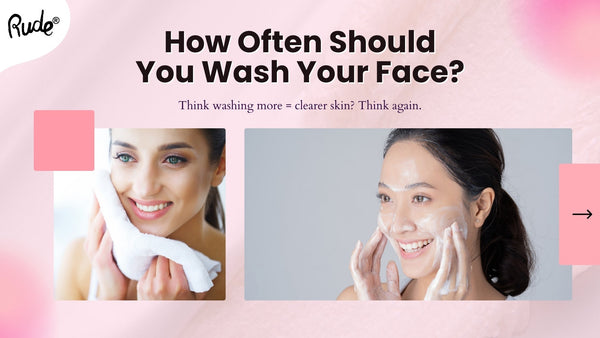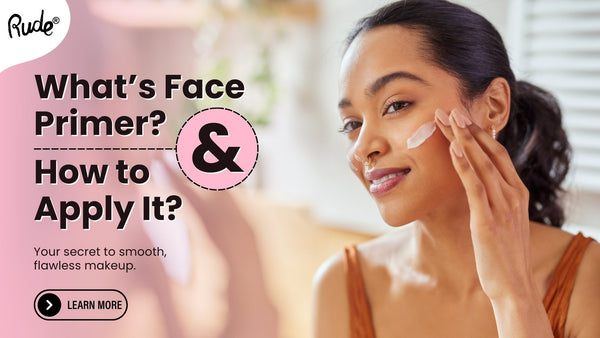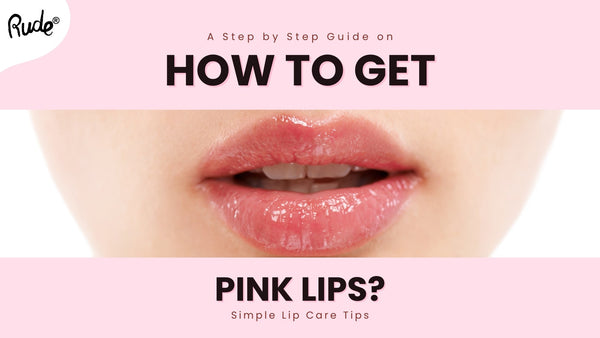Why Washing Makeup from Your Face is Non-Negotiable

Cleansing your face after wearing makeup isn't just a good practice, it's essential for maintaining healthy skin. Imagine leaving a layer of paint on a beautiful canvas overnight; just as the paint would eventually damage the canvas, makeup can harm your skin if left on too long. Does makeup ruin woman's skin? While makeup itself doesn't necessarily ruin skin, the habit of sleeping with makeup on can lead to clogged pores, breakouts, and an overall dull complexion. It's important to understand the importance of giving your skin a clean slate to breathe and recover each night.
Have you ever wondered if, is makeup bad for your skin? or does makeup age your skin? Leaving makeup on overnight can accelerate the aging process by breaking down collagen and exposing the skin to free radicals. This can lead to premature wrinkles and a loss of youthful elasticity. By washing off your makeup each night, you're not only removing the day's buildup of oils and dirt but also helping to prevent these potential issues. The simple act of cleansing before bed plays a pivotal role in keeping your skin looking young and healthy.
To maintain a radiant and youthful appearance, think of your nighttime skincare routine as an important investment in your skin's future. Do you often feel too tired to wash your face at night? We understand the temptation to skip this step, but consider the long-term benefits of this essential habit. Removing your makeup and cleansing your skin properly each night is the key to avoiding unwanted skin problems and maintaining a glowing complexion. Remember, healthy skin is always in, and it starts with clean skin!
Read our blog to learn about the best techniques and common issues with makeup removal. We cover all the essentials to help keep your skin looking its best, make sure to read on!
When Should You Wash Makeup Off?
Knowing when wash makeup from face is key to maintaining clear and healthy skin. Let’s explore the best times to cleanse and how long makeup should stay on your face.

Before Bedtime Is a Must
Always wash your makeup off before bedtime, no matter how tired you are. Sleeping with makeup on can lead to clogged pores, irritation, and even premature aging. Your skin needs time to breathe and repair overnight, and leaving makeup on disrupts this natural process. If you’re wondering how long to keep makeup on face, the answer is simple: no longer than your day requires.
Signs You Need to Remove Makeup Immediately
If your skin feels itchy, irritated, or looks unusually dull, it’s a sign that makeup removal is overdue. Wearing makeup for extended periods can trap dirt and oils, leading to breakouts or redness. Pay attention to these signs and address them promptly by cleansing your face thoroughly.
Quick Cleansing Routines for Busy Schedules
Don’t have time for an elaborate routine? Keep it simple! Use a gentle makeup remover cleanser to wipe away your makeup, followed by a mild face wash. This two-step process can fit into even the busiest schedule and ensures your skin stays fresh and healthy. Remember, even a quick cleanse is better than skipping this vital step.
Taking a few minutes to remove makeup properly can make a big difference in your skin's health and appearance. Prioritize this small step for long-term benefits your skin will thank you for!
How to Remove Makeup the Right Way
Proper makeup removal is essential for maintaining healthy skin. Wondering how to wash off makeup effectively? Follow these steps to ensure your face is thoroughly cleansed without causing irritation.

Start with a Gentle Makeup Remover or Cleansing Oil
Wondering about the best way to take off makeup? Start by applying a gentle makeup remover cleanser oil to your face. These products dissolve makeup, including waterproof formulas, without stripping your skin's natural oils. Massage the remover onto dry skin, focusing on areas with heavy makeup, to break down the products effectively.
Double-Cleanse for Thorough Cleaning
After using the makeup remover, follow up with the best cleanser to take off makeup that suits your skin type. This two-step process, known as double cleansing, ensures that all traces of makeup and dirt are eliminated, leaving your skin clean and refreshed.
Follow Up with Toner and Moisturizer
Once your face is clean, apply a toner to balance your skin's pH levels and remove any residual impurities. Finish with a moisturizer suitable for your skin type to replenish hydration and maintain a healthy skin barrier.
Be Gentle to Avoid Skin Damage
Always handle your skin with care during the makeup removal process. Use the best makeup remover and cleanser to ensure effective cleansing without harsh rubbing or tugging, especially around the delicate eye area, to prevent irritation and potential damage. Use soft cotton pads or your fingertips to apply products gently.
By following these steps, you can effectively remove makeup while preserving your skin's health and natural glow.
Best Practices for Makeup Removal by Skin Type
customizing your makeup removal routine to your skin type ensures effective cleansing and maintains skin health. Here's how to approach makeup removal for different skin types.

Dry Skin
For dry skin, it's essential to use hydrating products that cleanse without stripping natural oils. Opt for a gentle makeup remover cleanser like a cleansing balm or oil, which effectively dissolves makeup while providing moisture. Follow up with a creamy, non-foaming cleanser to maintain hydration. Look for products containing ingredients like hyaluronic acid or glycerin to boost moisture levels.
Oily Skin
Oily skin benefits from products that control excess sebum without over-drying. Start with micellar water formulated for oily skin to remove makeup and impurities. Then, use a foaming cleanser containing salicylic acid to deep-clean pores and reduce oiliness. Regular cleansing helps prevent clogged pores and breakouts.
Combination Skin
Combination skin requires a balanced approach to address both oily and dry areas. Micellar water is an excellent choice for initial makeup removal, as it's gentle yet effective. Follow with a gel-based cleanser that cleanses without over-drying, maintaining balance across different facial zones. Pay attention to how your skin responds and adjust products as needed.
Sensitive Skin
Sensitive skin needs extra care to avoid irritation. Choose fragrance-free, hypoallergenic products. Micellar water designed for sensitive skin can gently remove makeup without causing redness. Follow with a mild, soothing cleanser containing calming ingredients like chamomile or aloe vera. Always patch-test new products to ensure they don't cause adverse reactions.
Using dermatologist-recommended products ensures that the formulations are suitable for your skin type and have been tested for efficacy and safety. Consulting with a dermatologist can provide personalized recommendations customized to your skin's specific needs.
By customizing your makeup removal routine to your skin type, you can effectively cleanse your face while maintaining its natural balance and health.
Is It Bad to Sleep with Makeup On?
Leaving makeup on overnight can lead to various skin issues, including irritation, acne, and accelerated aging. Understanding these consequences highlights the importance of proper makeup removal before bed.

Skin Irritation and Acne
Sleeping with makeup on can clog pores, trapping dirt and oil beneath the surface. This environment fosters bacterial growth, leading to skin irritation and acne breakouts. Regularly cleansing your face before bed helps prevent these issues, keeping your skin clear and healthy.
Accelerated Skin Aging
Makeup left on overnight can impede the skin's natural repair process. This disruption may result in premature aging signs, such as fine lines and wrinkles. By removing makeup before sleep, you allow your skin to regenerate effectively, maintaining a youthful appearance.
Eyelash Damage from Sleeping with Mascara
Is it bad to sleep with mascara on? Yes, it is. What happens if you sleep with mascara on? It can cause your eyelashes to become brittle and prone to breakage. Additionally, mascara particles may flake off and enter the eyes, leading to irritation or infections. Removing mascara before bed protects your lashes and overall eye health.
Including a nightly makeup removal routine is essential for maintaining healthy skin and preventing potential damage. Taking a few minutes each evening to cleanse your face can lead to long-term benefits for your skin's appearance and health.
Can You Remove Makeup with Water Alone?
While water is essential for cleansing, it isn't sufficient to effectively remove makeup, especially products designed for long wear or waterproof formulas. Relying solely on water can leave behind residues that may clog pores and lead to skin issues.
Limitations of Using Water Alone
Water lacks the necessary properties to dissolve oils and synthetic compounds found in many makeup products. As a result, simply washing your face with water may leave traces of makeup, leading to potential skin irritation or breakouts.
Importance of Using Makeup Removers
To ensure thorough cleansing, it's advisable to use products specifically formulated for makeup removal. Options like micellar water, cleansing oils, or makeup remover wipes are designed to break down and lift away makeup effectively. including these products in your routine ensures that your skin is properly cleansed and prepared for subsequent skincare steps.
In short, while water is a vital component of cleansing, it should be complemented with appropriate makeup removal products to maintain healthy and clear skin.
Evening Skincare Routine After Makeup Removal
After removing makeup, following a structured skincare routine is essential to maintain healthy, glowing skin overnight.
- Cleanse Thoroughly: Begin by washing your face with a gentle cleanser to remove any remaining impurities. This step ensures your skin is clean and ready to absorb subsequent products.
- Apply Toner: Use a toner to balance your skin's pH levels and remove any leftover residue. Toners can also tighten pores and prepare your skin for better absorption of serums and moisturizers.
- Use Serums: Incorporate serums that address specific skin concerns, such as hydration, brightening, or anti-aging. Serums contain concentrated active ingredients that penetrate deeply into the skin.
- Moisturize: Apply a suitable moisturizer to lock in hydration and create a protective barrier. This step is important for keeping your skin supple and preventing dryness.
- Apply Night Cream: Finish with a nourishing night cream to provide additional hydration and support your skin's natural repair processes during sleep.
By adhering to this evening skincare routine, you can effectively clear your face overnight and promote a healthy, radiant complexion.
Common Myths About Makeup and Skin Health
Misconceptions about makeup and skin health can lead to improper skincare practices. Let's address some common myths and provide clarity based on scientific insights.

Myth: Makeup Ages Your Skin
Some believe that wearing makeup accelerates skin aging. However, makeup itself doesn't cause aging. The key is proper removal. Leaving makeup on overnight can lead to clogged pores and breakouts, which may contribute to premature aging signs. Therefore, thorough cleansing is essential to maintain skin health.
Myth: It's Okay to Sleep with Light Makeup
Even light makeup can trap dirt and environmental pollutants on your skin. Sleeping without removing makeup prevents the skin from undergoing its natural repair process, potentially leading to dullness and irritation. Regardless of how minimal the makeup is, it's important to cleanse your face before bed to allow your skin to breathe and rejuvenate.
Myth: Wearing Makeup Every Day Is Bad for Your Skin
Many people ask, is it bad to wear makeup everyday? In reality, wearing makeup daily isn't inherently harmful. The important factor is proper removal. Consistently cleansing your face at the end of the day prevents issues like clogged pores and breakouts, maintaining skin health.
Myth: You Don't Need Sunscreen When Wearing Makeup with SPF
Many believe that applying makeup containing SPF eliminates the need for separate sunscreen. However, the SPF in makeup is often insufficient for full protection. Dermatologists recommend using a dedicated sunscreen under your makeup to ensure adequate defense against harmful UV rays.
By understanding and debunking these myths, you can adopt better skincare habits that promote a healthy and radiant complexion.
Conclusion
Removing makeup before bed is a key step in keeping your skin clean and healthy. Skipping this step can cause clogged pores, acne, and early signs of aging. Following makeup removal, using products that suit your skin type, whether it’s dry, oily, or sensitive, helps you take better care of your face. Adding steps like cleansing, toning, and moisturizing will leave your skin feeling fresh and glowing.
Rude Cosmetics offers bold, creative makeup options at affordable prices. All our products are cruelty-free, paraben-free, and vegan, making them safe for your skin and kind to animals. With our wide range, we encourage you to express your unique style while choosing beauty that aligns with your values.
Frequently Asked Questions
1. Why is it important to remove makeup before bed?
Removing makeup at night is important because it prevents clogged pores, which can lead to breakouts and blackheads. Makeup left on the skin also traps dirt and oil, creating an environment for bacterial growth. Additionally, makeup blocks the skin's natural repair process that occurs overnight, leading to dullness and premature aging. Proper makeup removal ensures that your skin breathes and repairs itself while you sleep.
2. What happens if you don't wash off makeup at night?
Sleeping with makeup on can cause severe skin problems. The buildup of dirt, oil, and makeup residue clogs pores, leading to acne and irritation. Over time, it accelerates skin aging by preventing the skin from shedding dead cells and repairing collagen. Mascara or eyeliner left on overnight can irritate the eyes, potentially causing redness or infection.
3. How can I effectively remove makeup without damaging my skin?
To remove makeup safely, start with a gentle makeup remover like micellar water or a cleansing oil to dissolve makeup. Follow up with a cleanser that suits your skin type to remove any leftover residue. Avoid harsh scrubbing or tugging, especially around the eyes, as it can cause irritation or damage. Always use soft cotton pads or your fingers to apply products gently.
4. Can I use water alone to remove makeup?
Water alone is not effective in removing makeup, especially waterproof or long-lasting formulas. It doesn't dissolve the oils and waxes found in makeup. Using a dedicated makeup remover or cleanser specifically designed for makeup removal is essential for thorough cleansing.
5. What are the best products to remove makeup?
The best products depend on your skin type. Micellar water is ideal for all skin types and is especially gentle for sensitive skin. Cleansing oils work well for heavy or waterproof makeup, while gel or foaming cleansers suit oily and combination skin. Always choose products that are labeled as non-comedogenic and suitable for your skin type.
6. How long should I keep makeup on my face?
Makeup should ideally be removed before bedtime. Wearing it for more than 12 hours can increase the risk of clogged pores and skin irritation. Removing makeup as soon as you're home for the day allows your skin to recover and stay healthy.
7. Does wearing makeup every day harm your skin?
Wearing makeup daily doesn't harm the skin if you practice proper removal and skincare routines. Use non-comedogenic products to avoid clogging pores, and cleanse your face thoroughly each night. Regularly moisturizing and applying sunscreen under makeup can also protect and maintain your skin’s health.




